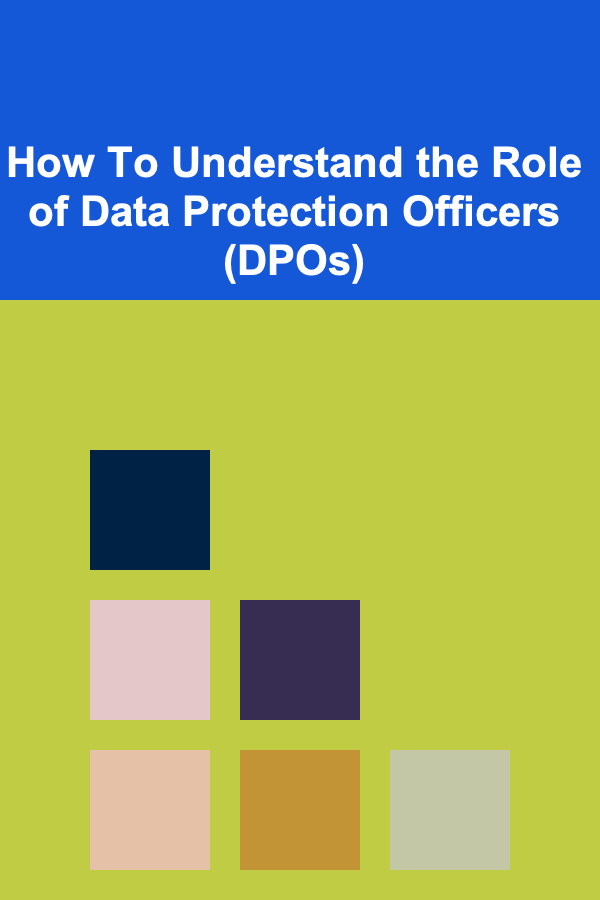
How To Understand the Role of Data Protection Officers (DPOs)
ebook include PDF & Audio bundle (Micro Guide)
$12.99$10.99
Limited Time Offer! Order within the next:

In today's digital age, personal data is one of the most valuable assets that organizations handle. From customer information to employee records, businesses collect and process vast amounts of data to provide services, improve operations, and drive innovation. However, this abundance of data brings with it significant privacy and security risks, as well as regulatory obligations that must be met to protect individuals' privacy rights. This is where the role of Data Protection Officers (DPOs) becomes crucial.
A Data Protection Officer (DPO) is a professional responsible for overseeing and ensuring that an organization complies with data protection laws and regulations, as well as maintaining a culture of data privacy within the organization. The increasing importance of data protection, especially with laws like the General Data Protection Regulation (GDPR) in Europe, has elevated the position of DPOs to a key role in modern businesses and public sector organizations. In this article, we will delve into the importance of the DPO role, the responsibilities they hold, their qualifications, the challenges they face, and how organizations can leverage the expertise of DPOs to build a robust data protection strategy.
What is a Data Protection Officer (DPO)?
A Data Protection Officer (DPO) is an individual designated to ensure that an organization adheres to data protection laws and regulations. Their primary responsibility is to ensure that personal data is processed in a way that is compliant with legal requirements, such as the GDPR, the California Consumer Privacy Act (CCPA), or other national or international privacy laws.
The DPO acts as an advisor, an educator, and a watchdog for the organization, helping to implement best practices for data handling, processing, and protection. They work closely with internal teams, such as legal, IT, compliance, and security, to ensure the organization's data protection policies and procedures are up to date and are being followed correctly.
Key Responsibilities of a DPO
The specific tasks and responsibilities of a DPO can vary depending on the size of the organization, the nature of its data processing activities, and the applicable legal framework. However, there are several core responsibilities that all DPOs share:
1. Advising on Data Protection Obligations
The DPO's primary role is to advise the organization on its obligations under data protection laws. This involves providing guidance on compliance with various regulations, assessing risks, and suggesting steps to mitigate those risks. DPOs work to ensure that the organization processes personal data lawfully, transparently, and fairly, and that data subjects' rights are respected.
2. Monitoring Data Protection Compliance
DPOs are tasked with ensuring that the organization implements and adheres to appropriate data protection policies and practices. They conduct regular audits, assessments, and reviews to ensure compliance with data protection laws. This includes reviewing data processing activities, identifying any non-compliance risks, and recommending corrective actions.
3. Risk Management and Impact Assessments
One of the most critical aspects of a DPO's job is risk management. They are responsible for conducting Data Protection Impact Assessments (DPIAs) whenever the organization is introducing new data processing activities that could potentially impact the privacy of individuals. DPIAs are used to assess the risks associated with new projects or data processing methods and ensure that privacy risks are mitigated before any data processing begins.
4. Ensuring Data Subject Rights
DPOs are responsible for safeguarding the rights of data subjects, which include the right to access, correct, erase, and transfer their data. They ensure that the organization has mechanisms in place to allow individuals to exercise these rights. The DPO acts as the point of contact for individuals who wish to exercise their privacy rights and oversees how data subject requests are handled.
5. Training and Raising Awareness
Data protection compliance is not the responsibility of the DPO alone. It requires the involvement of all employees within the organization. DPOs play a key role in educating employees on data protection principles and best practices. They organize training sessions to raise awareness of privacy issues and ensure that staff understand their responsibilities regarding data protection.
6. Liaising with Supervisory Authorities
In cases of a data breach or other significant privacy issues, the DPO is the point of contact between the organization and regulatory bodies. They are responsible for reporting breaches to supervisory authorities within the required time frame, as stipulated by laws like the GDPR. They also cooperate with authorities during investigations, audits, or inquiries related to data protection.
7. Handling Data Breaches
In the event of a data breach, the DPO plays a critical role in managing the situation. They are responsible for assessing the breach's severity, notifying the relevant authorities, and communicating with affected individuals. DPOs ensure that the organization responds quickly and effectively to minimize the damage caused by data breaches and comply with notification requirements.
Legal Frameworks and the Importance of the DPO
The DPO role has become especially prominent in light of recent developments in data protection regulations, such as the GDPR in the European Union. The GDPR, which came into effect in May 2018, introduced several new privacy protections for individuals and placed more stringent requirements on organizations that process personal data.
Under the GDPR, certain organizations are required to appoint a DPO. These include:
- Public authorities or bodies.
- Organizations engaged in large-scale systematic monitoring of individuals (e.g., online behavior tracking).
- Organizations engaged in large-scale processing of special categories of data (e.g., health data, racial or ethnic data).
Even for organizations that are not legally required to have a DPO, many still appoint one to ensure compliance and mitigate legal risks.
The Role of the DPO in GDPR Compliance
The GDPR specifically outlines the role of the DPO and requires that the individual be independent, an expert in data protection, adequately resourced, and report directly to the highest management level of the organization. DPOs under the GDPR must have a comprehensive understanding of the organization's data processing activities and be able to provide impartial advice on compliance matters.
For organizations subject to the GDPR, appointing a DPO is not only a legal requirement but also a strategic move to protect against data breaches, lawsuits, and reputational damage. The DPO's role in ensuring compliance with the GDPR's accountability principle and the documentation requirements is essential for minimizing the risk of regulatory penalties.
Qualifications and Skills of a Data Protection Officer
The role of the DPO requires a broad skill set, including a deep understanding of data protection laws and regulations, as well as expertise in data security and risk management. While the exact qualifications may vary, there are certain key attributes that make a successful DPO.
1. Knowledge of Data Protection Laws
A DPO must have a comprehensive understanding of the relevant data protection laws, including the GDPR, CCPA, and other regional or national laws that may apply. This knowledge enables them to advise the organization on compliance and best practices for handling personal data.
2. Expertise in Information Security
While the DPO's primary focus is on data privacy, they also need a strong understanding of information security. They should be knowledgeable about technical measures and controls that protect data, including encryption, access control, and secure data storage.
3. Risk Management and Analytical Skills
The DPO should have strong analytical skills to assess data protection risks and the impact of various activities on individuals' privacy. They need to be able to conduct risk assessments and recommend practical solutions to mitigate privacy risks.
4. Communication and Interpersonal Skills
The DPO needs to be able to communicate complex privacy and security issues clearly and effectively to different stakeholders within the organization. They must be able to engage with employees, management, and external authorities and build a culture of data protection across the organization.
5. Independence and Objectivity
The DPO must operate independently and without conflict of interest. They are required to provide unbiased advice and ensure that the organization complies with data protection laws, even if it means challenging senior management or other departments.
Challenges Faced by Data Protection Officers
While the DPO role is essential, it also comes with a variety of challenges that can make the position demanding.
1. Balancing Compliance and Business Objectives
Data protection laws can sometimes conflict with business objectives. For example, data protection regulations may limit the way an organization collects, processes, and uses personal data. DPOs must find a balance between ensuring legal compliance and supporting business growth and innovation.
2. Keeping Up with Changing Regulations
Data protection laws are constantly evolving. New regulations and amendments to existing laws can create a moving target for DPOs. Staying updated on changes in legislation and ensuring the organization remains compliant can be a daunting task.
3. Overcoming Organizational Resistance
In some organizations, data protection may not be seen as a priority. DPOs often face resistance when trying to implement data protection measures, especially when they are perceived as hindrances to business operations. Overcoming this resistance and gaining buy-in from all levels of the organization can be a challenge.
4. Managing Data Breaches
Despite best efforts, data breaches can still occur. DPOs must act quickly and effectively in response to breaches to mitigate damage. This requires having robust breach detection systems, well-established incident response plans, and the ability to navigate regulatory requirements for breach reporting.
Conclusion
The role of the Data Protection Officer is critical in today's data-driven world. As organizations face increasing scrutiny over their data handling practices, the DPO serves as a vital figure in ensuring compliance with privacy laws and fostering a culture of data protection. Their expertise, advice, and leadership in managing privacy risks help organizations protect sensitive data and maintain the trust of their customers and employees.
In a world where personal data is increasingly seen as an asset and a liability, DPOs are essential in balancing these dual aspects. By fulfilling their responsibilities and addressing the challenges they face, DPOs help safeguard not just data, but the very privacy rights of individuals, thereby contributing to the greater societal goal of protecting personal freedom in an interconnected world.

How to Implement a 'One In, One Out' Rule for Clutter Control
Read More
How to Review Horror Films for Suspense
Read More
How to Manage Oily Skin and Control Shine
Read More
How To Improve Your Puzzle-Solving Skills in Games
Read More
How to Discover Your Favorite Craft Beer Styles
Read More
How to Create Multiple Streams of Profit
Read MoreOther Products

How to Implement a 'One In, One Out' Rule for Clutter Control
Read More
How to Review Horror Films for Suspense
Read More
How to Manage Oily Skin and Control Shine
Read More
How To Improve Your Puzzle-Solving Skills in Games
Read More
How to Discover Your Favorite Craft Beer Styles
Read More